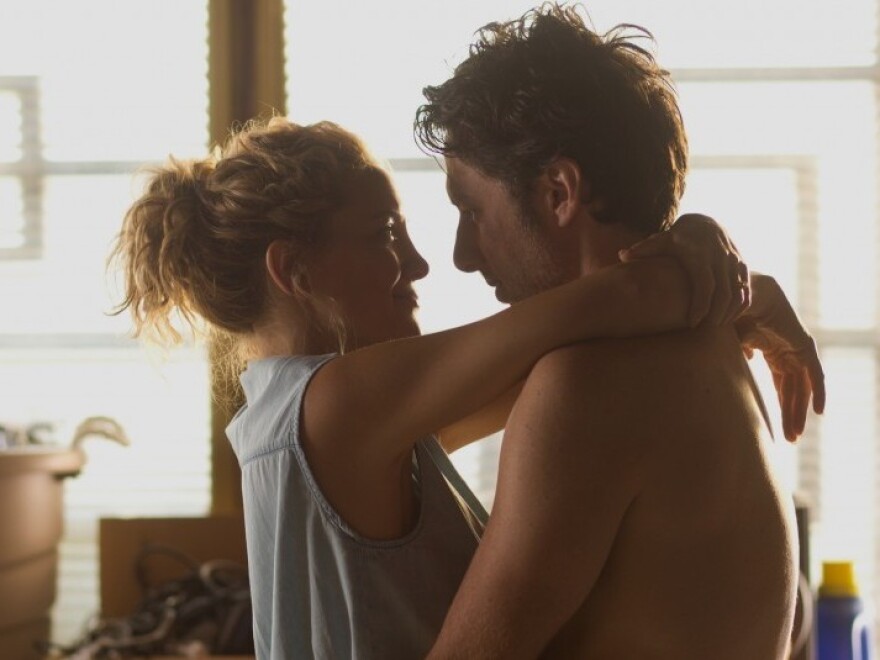It seems pretty clear what Zach Braff is up to. Ten years after his breakout debut as a writer/director, Garden State, Braff has returned with Wish I Was Here, a partially Kickstarter-funded film that is neither a sequel nor a remake, but feels as much like both of those as a film with no narrative connection to Garden State possibly could.
In both movies, Braff plays a struggling actor at an existential crossroads. In both movies, his mother is dead, and he must deal with a disapproving father. In both, the love of an unfailingly supportive woman is a piece of his salvation. Both are soundtracked with gentle indie and classic rock tunes that cover even the present in a film of dreamy instant nostalgia. The big difference is that this time, he's married with children, and his second parent is also not long for this world. Braff has taken the same house and redecorated it with the concerns of a guy staring down the latter half of his thirties rather than his late twenties.
It's not much of a stretch to imagine that in 2024 we can look forward to Braff's meditation on middle age, as he plays a journeyman actor approaching 50 and no longer able to nail down work, paying alimony to his ex-wife, and struggling to put his kids through college while he awaits the results of a biopsy on his worrisome enlarged prostate. It'll be like Richard Linklater's Before series, only for anxious-but-souful dudes.

It's not that the issues Braff is dealing with are imaginary or frivolous. His character here, Aidan, is at a point many people who take extended periods of time reaching for their dreams get to, when there's a family to support and maybe it's time to decide if the path you're on is a dead end. His wife Sarah (Kate Hudson) is working the soul-sucking office job with a side of casual sexual harassment that thousands put up with every day. His father Gabe (Mandy Patinkin) has cancer that's just taken a turn for the worse, and Gabe's promise to pay for private school for Aidan and Sarah's kids – so long as it's a conservative Orthodox yeshiva – has to be retracted so that he can pay for an experimental treatment.
These are real problems, and Braff seems sincere in his desire to set up an honest picture of thirty-something familial struggle. But as messy as the setups are, the solutions are ludicrously neat and tidy. There's truth to be found in platitudes, of course; in a general sense, a positive outlook can do a lot to improve one's quality of life, forgiveness is a virtue, and coming to terms with mortality and one's place in the universe can be a source of peacefulness. But those are simplified distillations of complex processes, and Wish I Was Here never gets beyond that surface level, preferring to devolve into shapeless, wispy montages to stand in for actual engagement with its ideas. (There are no fewer than three montages, making this the Rocky IV of sensitive male crisis movies.)
Much as was the case in Garden State, Braff attempts to use quirky set pieces, like conning one's way into a test drive of an Aston Martin to feel the freedom of speed and the wind through one's hair, to allow his characters to declare their individuality in a world determined to grind them down. But it all ends up coming off as a series of on-the-nose metaphors, like Garden State's representation of screaming into the void consisting of having characters actually scream at the edge of a deep quarry. Here, his daughter, who's been accused of lacking color in her life, introduces some color by way of a bright purple wig to cover up the fact that she shaved her head in a fit of adolescent rage. Later, as she's being encouraged to take the plunge into a new life outside the yeshiva, she winds up literally taking a plunge into a pool.
The film also, unfortunately, shares with Garden State some unfortunate female trouble as well. Natalie Portman's character in that film saved Braff's with her free-spirited quirkiness, and as we join Aidan and Sarah's marriage midstream, it's apparent that much of her existence to this point has been in service of him as well. Braff addresses this explicitly in one of the movie's best scenes, as Sarah points out just how much she's sacrificed and Aidan realizes how blind he's been. Except that then, the movie gives him a legitimate excuse to continue requiring her selfless support, in the form of his dying father. The only real gesture of penance he engages in is taking the kids away for a night and leaving her an envelope with some spare cash for her to get herself a massage.
Movies about big ideas necessarily have to approach them in the small ways so that we deal with them on a personal level. But Wish I Was Here's philosophical scope never gets much bigger than the slip of paper inside a fortune cookie. It's only meaningful for a moment, gone and forgotten as quickly as if it flashed by on the wind rushing past that test-driven Aston Martin.
Copyright 2021 NPR. To see more, visit https://www.npr.org.



